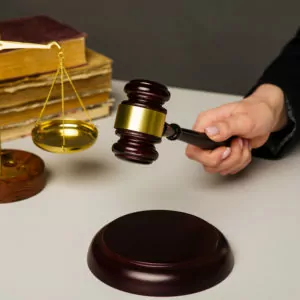 The First Amendment protects most types of speech, but this does not mean there are no restrictions on what you can say or the content you produce. In fact, if you produce or disseminate certain types of conduct that is classified as obscenity, you could actually face federal criminal charges.
The First Amendment protects most types of speech, but this does not mean there are no restrictions on what you can say or the content you produce. In fact, if you produce or disseminate certain types of conduct that is classified as obscenity, you could actually face federal criminal charges.
Being charged with an obscenity crime can be damaging to your reputation and can put you at risk of serious federal penalties.
You need to understand the charges that have been brought against you when you are charged with a federal offense related to obscenity because these charges could change your future.
LV Criminal Defense can help. Our dedicated and experienced federal criminal defense attorneys provide representation to clients in Arizona, Nevada, Utah, California, Oregon, and surrounding areas.
We help with presenting evidence and raising defenses in court to maximize the chance of an acquittal, as well as with negotiating a plea agreement to try to reduce penalties you could face if you have been charged. To find out more about the ways in which we can help you respond to obscenity charges, give us a call today.
Only certain types of obscene conduct can result in a defendant facing federal criminal charges. The statutes establishing when obscenity crosses over to the level of criminal conduct that can result in federal charges are found in 18 U.S. Code Chapter 71. There are 12 statutes in 18 U.S. Code Chapter 71 that deal with obscenity offenses, including a statute establishing presumptions as well as a law dealing with criminal forfeiture in connection with obscenity offenses. The relevant statutes include:
Nick Wooldridge has a long track record of representing clients accused of serious federal and state crimes in Nevada.
Each of these different statutes has different specific elements a prosecutor would need to prove in order for a defendant to be found guilty of a federal crime under 18 U.S. Code Chapter 71.
For example, the crime of possession with intent to sell, or sale, of obscene material on federal property can result in imprisonment for up to two years.
However, in order for a defendant to be convicted, a prosecutor would need to show that a defendant was within the special maritime and territorial jurisdiction of the United States, was in Indian Country, or was on land or buildings owned, leased, or controlled by the U.S. government. A prosecutor would also need to show that while in one of these specific locales, the defendant knowingly sold or possessed with intent to sell an obscene visual depiction. An obscene visual depiction is defined to include undeveloped film as well as undeveloped video tape. However, mere words are not included.
If a prosecutor was not able to prove any element of the offense, such as being unable to show a defendant was on federal land, being unable to show that the defendant knowingly sold or possessed obscene visual depiction, or being unable to show that the defendant acted knowingly, then the defendant should be acquitted.
On the other hand, 18 U.S. Code section 1462 defines a different offense. Under this statute, a defendant could be convicted of the importation or transportation of obscene matters for bringing obscene, lewd, lascivious, or filthy books, pamphlets, films, or other indecent items into the U.S. or into any place under U.S. jurisdiction. Bringing abortion drugs or tools meant to cause abortion; or bringing in advertisements or information about drugs or tools meant to cause abortion, can also result in a defendant being tried under this statute.
When I initially met with Mr. Wooldridge, he took the opportunity to sit and go over my problem with me. He described details in my case which he found disturbing and explained why he I should have him on my side.
If a prosecutor can prove a defendant acted in violation of 18 U.S. Code section 1462, a defendant could be imprisoned for up to five years and could face a fine as well as this lengthy maximum prison sentence.
Because each statute requires a prosecutor to show different things, defendants need to understand the specifics of what must be proved based on the crime they’ve been accused of committing. Working with an attorney who knows the law helps defendants to understand the elements of a crime so a defendant can raise appropriate defenses.
 5 Star30 reviews
5 Star30 reviewsA federal criminal defense lawyer at LV Criminal Defense can help you to respond to charges connected with obscenity. If you have been accused of violating the provisions of 18 U.S. Code Chapter 71 and you live in California, Arizona, Oregon, Nevada, Utah, or surrounding areas, our firm is here to fight on your behalf for acquittal or for a reduced penalty during plea negotiations.
Responding assertively to charges can help you to develop a smart legal strategy and get the best outcome possible when you have been accused of serious federal crimes related to obscenity.
Whether you are negotiating a plea or trying to secure a not guilty verdict by introducing reasonable doubt or raising affirmative defenses, our legal team has the experience needed to help you maximize the chances of success. To find out more about the help we can offer you, give us a call today.